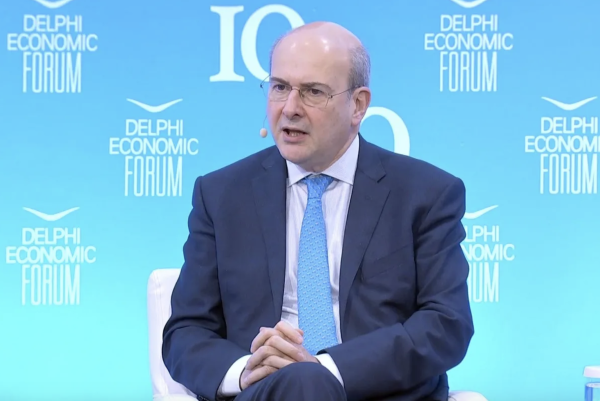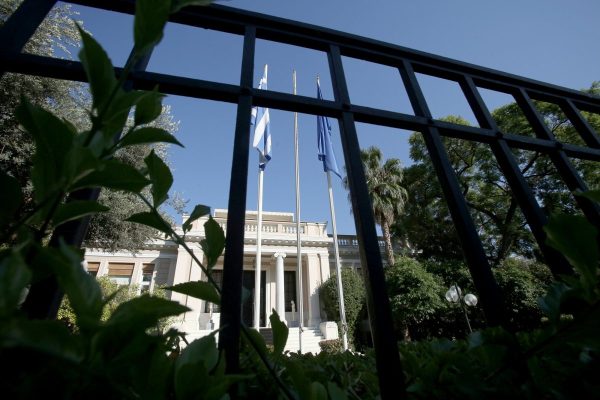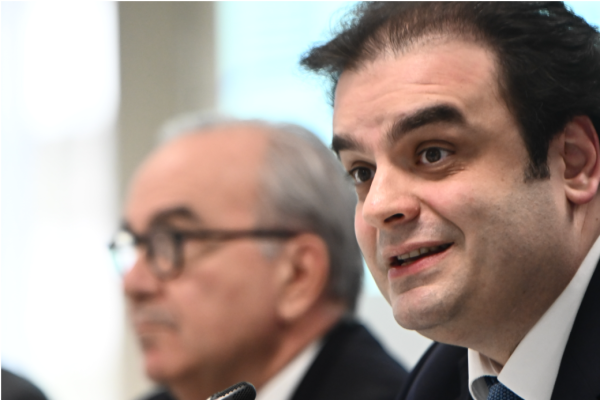
Thousands of workers gathered for a strike demonstration in central Athens on Wednesday protesting the rising cost of living, demanding improved salaries, and calling for better protections on working conditions.
“We are striking for wages, for stable work, against inflation,” Dimitra Rizou, an administrative employee and member of the Association of Employees of the Region of Attica told To Vima International Edition. “We cannot cover our basic expenses. The electricity, the food, everything is difficult.”
Inflation, particularly in food prices, has been crushing Greek households. According to Eurostat, inflation in Greece was around 3.2% in October, and particularly high in the prices of basic goods. According to the Greek statistical authority, low-income families spend about a third of their budget on food.
The average adjusted annual salary in Greece stands at €17,000 or around €1,540 per month. This number, which is higher than what many Greek workers actually take home each month, is already in the bottom three in the EU.
Greek wages and pensions dropped and were slashed through years of austerity as the country tried to meet the requirements of international lenders and receive bailout funds. Both wages and pensions have been hiked back a bit since then, and minimum wage in the country now stands at €830 per month. However when factoring in the high consumer price index, calculations put the real wage at around 693 euros.
Both the soaring inflation and the low wages mean Greek workers are struggling to make ends meet.
“I will tell you that in 2012, the collective bargaining agreement we had provided for a minimum wage of €1120 euros per month for university graduates and €930 for non-graduates,” said Sokratis Lambos, the president of the Panhellenic Federation of Medical Attendants and Pharmacists in the demonstration on Wednesday. “The contract that is now proposed by the employers is €860 gross for everyone. So for graduates that is three hundred less than the contract we had 12 years ago.”
“During this time that we have reduced salaries, we have also had a reduction in the purchasing power of our salaries,” stated Lambos. “The result is that we are in a financial impasse for all workers.”
Recent data from Greece’s statistical authority (EL.STAT) found that 18.7% of the Greek population were at risk of poverty in 2023, an increase from 17.4 % the previous year.
“There is absolute poverty,” said Nektarios Kordis, a high-school teacher and member of the Federation of Secondary Education Workers’. He said the minimum wage for teachers is €776 per month. “Think about it. A person is forced to pay around €500 in rent and has €270 left to live on for the whole month.”
Greece’s two biggest umbrella trade unions– GSEE, the private sector union, and ADEDY, which represents civil servants, declared a nation-wide 24-hour strike Wednesday in protest of these conditions.
The private sector union demands included wage increases, measures to tackle profiteering, the restoration of the collective bargaining law, the assurance of affordable housing for all, and the implementation of social housing programs.
The public sector demands also called for wage increases, restoration of holiday bonuses for all, the repeal of recent laws which they state cut down on workers’ rights, and the restoration of the collective bargaining law. But there were some specific demands relevant to public sector workers such as calls for increased funding for the public health system, the recruitment of more healthcare workers, and reducing the number of students in public school classes to 15 per teacher.
“If you are looking for value in the classroom, we must move to smaller classes. 26 students in high school in high school does not work pedagogically, it does not work in any case, huge gaps are created,” stated Lambos of the teacher’s union. He said he has 22 students in his high school classroom, but knows colleagues in other schools that have 27. “There is a burnout of teachers, which the Ministry [of Education] doesn’t even deal with.”
Many pensioners were also in attendance at the strike demonstration. “We see inflation every day, product prices change,” said Girogos Lolos, of the Pensioners Association of Freelance Professionals Insurance Organisation (OAEE) of Athens and the Surrounding Areas. “This makes it difficult for us every day, and we suffer these prices more because our pensions are also low.”
According to a survey by the National Statistical Service of Greece,the average monthly pension is €816.95, with only about 30% of pensioners earning more than €1,000. However, only 31.2% of Greeks aged 50-74 are receiving a national pension at all, leaving the majority without financial support.
As strikers today wound around the center of Athens, protests were also held elsewhere around the country, from Thessaloniki to Crete.
The New Democracy government has suggested several measures to tackle the cost of living crisis including price reductions on essential goods, and further increases in the minimum wage. As the strike protest wound its way around the Greek parliament building in Athens’ central Syntagma square, legislators inside submitted Greece’s 2025 state budget which includes increased pensions, reduced taxes for freelancers, an increase in public sector wages, and increased compensation for public doctors.
But many remain skeptical. “The only way forward is for us to create collective labor agreements that will bring an increase to the middle salaries, and not only what the government claims to be achieving,” said Lambos of the pharmacist union. “We need to claim better working conditions in terms of hours, in terms of safety in the workplace, and of course a better state with better public health and better public education.”
A survey conducted last month found one in four Greeks does not believe that any government party or coalition of government parties can reduce the high rates of poverty in the country.
Source: tovima.com
Latest News

FM Gerapetritis Calls for Unified EU Response to Global Crises at EU Council
"Europe is navigating through unprecedented crises — wars, humanitarian disasters, climate emergencies," he stated.

Holy Week Store Hours in Greece
Retail stores across Greece are now operating on extended holiday hours for Holy Week, following their Sunday opening on April 13. The move aims to accommodate consumers ahead of Easter, but merchants remain cautious amid sluggish market activity.

Green Getaway Ideas for Easter 2025 in Greece
Celebrate Easter 2025 in Greece the sustainable way with eco-farms, car-free islands, and family-friendly getaways rooted in nature and tradition.

Civil Protection Minister Details Summer Firefighting Plans at Delphi Forum
At the 10th Delphi Economic Forum, Minister of Climate Crisis and Civil Protection Yiannis Kefalogiannis discussed Greece's plans for the upcoming fire season.

How Shops and Markets Will Operate During Easter Holy Week
The Easter holiday schedule has been in effect since April 10, with retail stores open Palm Sunday, and most supermarkets also operating to meet consumer demand for Easter shopping

Why Is the French Aircraft Carrier Charles De Gaulle in Piraeus?
Docking in Piraeus after a four-month deployment in the Indo-Pacific region, the admiral of the aircraft carrier the Charles de Gaulle says, "Greece is our best partner in the Mediterranean."

Riots and Vandalism in Downtown Athens Exarcheia Region
Night of unrest in downtown Athens' region of Exarcheia – 11 Cars Burned, 72 Detentions

Truth Team: Is the PM and his team telling the truth, the whole truth and nothing but the truth?
The Greek government spokesman noted that "a private individual received payment from other private individuals, and for some people this is a horrifying revelation."

Mayor of Athens Announces Strategy to Address Housing Crisis
Athens Mayor Haris Doukas outlined a series of municipal interventions aimed at tackling the housing crisis during a public event co-hosted with the University of Athens

Hatzidakis at Delphi Forum: Train Reform Bill to Cabinet on April 28
The Deputy Prime Minister stated that a draft bill concerning the Hellenic Railways Organization (OSE) will be brought before the cabinet on April 28

























![Εξοχική κατοικία: Κέρδη από την αξιοποίηση στην Ελλάδα – Οι αποδόσεις των νεόδμητων [γραφήματα]](https://www.ot.gr/wp-content/uploads/2025/04/paros-768x512-1-600x400.jpg)















 Αριθμός Πιστοποίησης
Αριθμός Πιστοποίησης